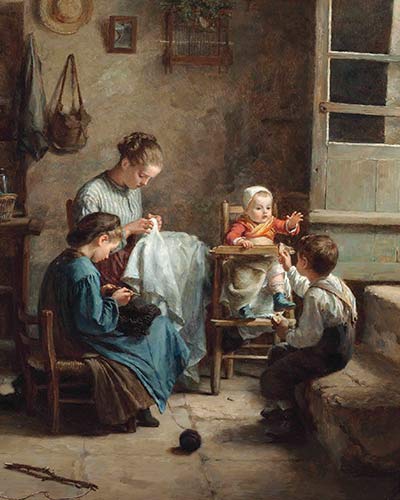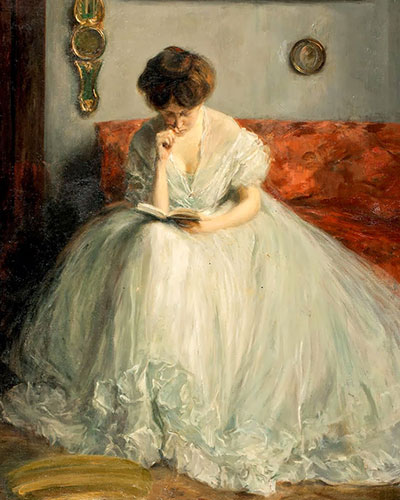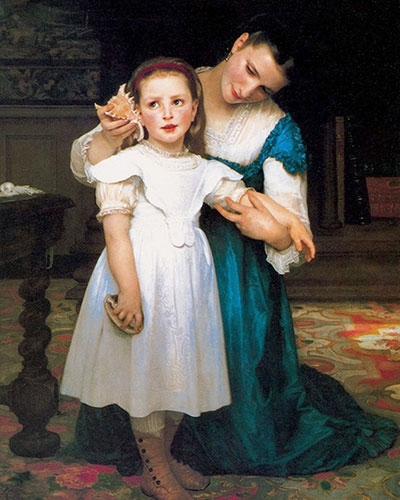From a UK article – They have it all… so why is it so hard for some women to be happy?
What is it women want? This is the question they (and, most likely, men) ask themselves all the time. Across the country every day, women say to themselves: ‘What happened to me? Where did my life go wrong?’
Men try to make us happy, but end up doing all the wrong things: they buy the wrong birthday presents, book the wrong type of treat, buy their wife the lingerie she doesn’t want to wear. Meanwhile, women look at their lives and think: ‘There must be more than this.’
Even those women who seem to have everything – husband, children, a healthy, happy lifestyle – ask themselves on a daily basis: ‘Why am I so bored?’ We are all, it seems, struggling with the fact that we feel dissatisfied – almost on an epidemic level.
When I talk to people, mainly women, no one seems happy with their lot. It’s as if their perception of who they should be has not matched up to the reality.
As my friend Clare told me the other day: ‘I think I’ve spent the past 40 years working out who I am and what I want, and now I’ve found it, I don’t know that I even want it.’
The article is lengthy but interesting. It’s obviously not written from a biblical perspective. But it got me to thinking about why women do seem so unhappy nowadays. I think it is a multi-faceted answer and not simply the fact that they bought into feminism. I think it is far more complicated than that.
I’m heading to bed so I think I’ll just throw this out here for discussion and see where we end up!
Are you happy? What makes your life satisfying? What is missing? What makes the greatest difference in your life in terms of being happy and satisfied? Are the women you know around you happy and satisfied with their lives? Do you see any difference in the lives of those who love Christ and those who don’t? Does the church contribute to the problem or offer solutions? How much does age factor into this? What are the other major factors?










 So We’ve Started Getting “Comments” About Sending Caroline To Preschool
So We’ve Started Getting “Comments” About Sending Caroline To Preschool
I don’t think women as a group are unhappier than men.
The oft-quoted statistic (if true) that 80% of divorces are initiated by women would beg to differ with you.
I can only speak for my generation.
I think one source of our unhappiness is the fact that we were taught that we were all to have these brilliant, dashing careers, and that these careers would fulfill us intellectually, emotionally, etc.
And then many of us found out that we’ve been had, that work is work, and while we might enjoy it, there’s a reason they pay us for it. This can lead to all sorts of angst like the folks in the article clip above, especially in mid-life.
This also applies to family and marriage life. Our culture is one of instant gratification, everything should feel good to me all the time. In many ways we’ve lost the idea of duty and honor, that we are to do things because they are the right things to do.
I can say I am happy, but I don’t know if I am happier than another woman who doesn’t have a strong faith. But I do know that I am happier since I’ve found my faith again. The world and the universe make sense.
I think that possibly we have just focused on being happy like chasing a carrot on a stick. When I found Christ and began to focus on Him and doing what I should , I look up and find now I am happier more satisfied and content then ever in my life. All those years of looking for happiness and thinking what do I want? how do I feel? What do I need? It was like eating sugar with a ladle out of the canister … a sure recipe for a big belly ache.
I’ll throw out a list of things I think all contribute to it…
Number 1? TV (and to a degree other forms of media such as magazines). Because if your life isn’t satisfying for some reason, you sure as heck can find someone on one of the 5 zillion stations who can tell you exactly what is wrong with your body, home, friendships, children, job, relationship, car, face, hair, career, money management, church, schools, spouse, parents, in-laws, city, state or country. Or if you don’t want to listen to someone talk about what is wrong with your life,you can just escape into someone else’s life until you absolutely have to turn the thing off and deal with reality.
Lack of boundaries and margin
Extremely mobile society where people often have no choice but to move
Loss of extended families being meaningful
Being overchoiced which I think is also related to too many opportunities and being spread too thin to truly enjoy anything or feel satisfied about what you accomplish in those areas.
Being expected to do too much and deal with things that women in the past just didn’t deal with. I’m not saying that we are worse off having these things, but they bring a tremendous amount of stress and “stuff” to juggle. These include: retirement and investment planning;, educational choices for children (whether you homeschool or have to be a constant watchdog re: what goes on at school); choosing a church and/or doctrine (in the past people were born into a denomination and usually spent their entire life in that denomination); moving on a regular basis and having to reestablish everything; managing technology and keeping up with the regular changes (cell phone plans, internet plans, cable/dish plans, computer purchases, etc.).
Just a few off the top of my head. 🙂
I think there are at least three different things going on the article. First, the struggles of trying to attain a state of happiness and material security. Second, the boredom of the women who have “arrived” at everything that they thought they wanted, and are kind of hanging at loose ends, not sure what to do next. Third, the lack in both cases of any satisfying relationship with Christ, and of having a role to fulfill in the Body of Christ.
Generally when I’m happiest it’s because I’ve been keeping regular devotional times, using my gifts and talents at home and within my church and community, and enjoying the family that God has given me. I’m least happy when I’m exhausted, when I see little lasting value in the things that I do, and when I’m isolated from fellowship with God, family, friends, and church.
In my life I see a correlation between happiness and connectedness. I am happiest when I feel the most connected to God (because I’ve spent more time with Him), to my husband, to my children, and to other women. I think the pace we’ve allowed ourselves to live our lives makes meaningful connection much more difficult. We become so busy that we don’t make time for the relationships in our lives. And relationships take time!
Sallie, I like your list in the comments! I totally agree with you that we can’t blanket the issue with saying that women have simply bought into feminism. I say this because I have met women who have totally NOT bought into feminism and are still discontent.
I think I would add to your list that modern life is generally lacking in beauty. There is no connection to nature, especially in the cities, but even in the suburbs. Also, life is often too fast to enjoy, even when it’s going well.
There are so many things. It reminds me of a person with major health problems, you know? Any one solution, like “eat better” isn’t going to fix it because there are so many different issues that intersect in that person. That is what I see in many discontented women, a lot of different things contributing.
For me, turning the TV off almost entirely (seven years ago now) was the first step to being a healed person. Even though I had been a Christian, I had let TV poison my mind and my heart.
I can only speak for myself and my own life situation. I really struggle with anxiety and sometimes that does border on depression. So much so that I’m medicated for it now. I take Prozac and while the church may consider that a great sin in itself to look for medication for help, it has truly helped me.
I have no idea how or why it happens. Something tells me women of ye olde long ago suffered anxiety and depression too. It isn’t a “new” thing. (there is nothing new under the sun as far as I’m convinced anyway)
Perhaps we are focused more on it now because we CAN talk to doctors, see psychiatrists, and take meds for it. Perhaps we are more open to the discussion. But I think the problem has always been there.
Women tend to suffer from it more, and I’m not sure why that is either. I suspect it has something to do with keeping the home fires burning and taking care of so many people. Face it, even in equitable marriage women still bear the brunt of family work and child rearing. Feminism didn’t change that. It’s been going on for years and years.
Perhaps it does have something to do with women working and not being home full time. I can tell you that in the 7 years I was a stay at home, home educating mom, I equally struggled with depression and anxiety. Going to work didn’t cause it, and it didn’t fix it.
Perhaps we’re just broken. I don’t know.
I always like to answer before reading the other posts.
I am joyful, not always happy, but I do have immense joy all the time. I am currently “hard-pressed” from all sides, but when I stop to think, “What else would I rather be doing,” I always come to the conclusion that life is ever so short and finding meaningful purpose, even if it does involve toil & weariness, is soul satisfying.
We live in a world saturated with leisure and entertainment. We live for retirement when we will *finally* get to do what we want. . . having wasted the years before in a state of misery and unhappiness as we deemed them “drudgery”. When and if we obtain the chance to do what we want, we believe we deserve it. If we do not obtain it, we are further discouraged and unhappy. We humans tend to think life is about getting the chance to laze by a pool in Las Vegas after a gambling session, accummulating material things to entertain ourselves, satisfying every gastronomical craving we have, etc. (Just to give a few examples.)
I think our happiness/joy lies in asking, “Just what is life about?”
For a woman or man (because both in my opinion are unhappy, gender does not matter), I believe the reason for this unhappiness is that they are confused as to what life is about. Miserable circumstances cloud their ability to see God’s hand in the matter. A lot of our unhappiness is us bucking against a circumstance God has put us in and we don’t want to be in it, and we can’t accept it as having any sort of Godly purpose.
And if life is about leisure, entertainment and obtaining those things, then we have enslaved ourselves to it. No wonder man and woman is unhappy!
But when one submits to God’s purposes and works for Him, no matter how menial or painful the task at hand is, there is a great sense of meaning and purpose. It just can’t get any better than that. And even in our discomfort in serving Him through doing hard things, I personally have found great joy and happiness. It’s been a privilege to do the hard things for Him so far. I have been surprised by this!
Specifically answering your questions about Christian women and other women, I think there is some difference. But even within, say, my Sunday School class, you can tell who has spiritually matured in this arena. There are Christians who are just absolutely miserable and can’t understand why in the world God wouldn’t just make them completely comfortable and serene. You can tell it in their prayer requests, their emotional states, etc. There’s a lacking of steadiness, perserverance and faith. Outside of church, non-Christian women are obvious as they are the ones trying all the time to escape to have their nails done and their shopping bags filled. They are always in pursuit of a time out with the girls to discuss the insensitive things their husbands did this past week. They typically seem to be the ones to compensate for their own unhappiness by pushing their kids more and more so the “kids will have had more opportunities than I had growing up” and hopefully be ahead and happier than others around them.
I don’t think the church, itself, contributes to the problem, but I do think the general pressure on women to provide more and more ministry to the detriment of family time and care is hurtful. At my church, there is pressure on moms to immerse themselves in ministry and teaching even if they have young babies and children that make it more difficult. There’s an insensitivity to that, and it frazzles women to think they have to live up to the standards of women in the church who have thrown up a facade of “perfection” (i.e. the woman who teaches and sings and gets involved in everything, but her children are neglected at home). That sort of pressure is problematic, I think. It makes a woman feel like a failure after a while.
As far as age goes. . . I think our oldest generation (my grandmothers in their late 80s) seem to have a better grip on what life is about. The Baby Boomers are horrible about this. And after that, there’s much confusion. Some of us are the products of Boomer parents that actually shared the same values as their own parents. I am the fortunate child of one of these, and thus, my values are the same as the oldest generation. But because a lot of Boomers lost those values and transferred “experimental” values to their kids, we’re overshadowed by a majority of peers who aren’t really sure what life is about. Some of these confused people are Christian peers even. They don’t realize they are trying to combine humanism with Christianity. And that’s just not working.
Joy is found in meaningful, God-given purpose. That can be found even in the midst of what we consider to be miserable and suffering.
Em, your comments are beautiful but I would caution you to think about people who indeed suffer from mental illnesses, depression, and anxiety. There is this tone to it that if you are “Christian” enough you shouldn’t be depressed or sad or let life get you down.
Do we tell Cancer patients and those who just had a heart attack that they should just trust God more, and they wouldn’t get sick?
NormalMiddle,
I think you missed the point of Em’s comment, if you don’t mind my saying so. I’m not sure she said that if one just believes hard enough or fervently enough or whatnot that life will suddenly be perfect. She even described herself as “hard pressed”. What she was expressing was the idea that joy is still possible.
I had a friend who died of a debilitating brain tumor a few years ago. In her last days, she was the most joyful person you could imagine. She had spent her very short life (she died in her 20s) giving to so many people around her, and she spent the end of her days dying, yes, but also reaping the good things she had sown. She was surrounded by loving arms and passed gently into the next life.
Seeing someone so faithful and joyous in death, having hope in a time that seemed hopeless to the world’s eye, forever changed my persepective.
The idea isn’t always that life will get better, but that, in the midst of the trials, we will meet God.
NormalMiddle, I deeply am sorry if I offended anyone who is suffering any mental illness, depression or anxiety. I did not mean to come across that way. . . if anything, I believe that Christians just as much as anyone else can walk through dark valleys. I have been there myself and expect to be there again. Depression runs like a thread in my family.
Why God allows us to suffer in these ways, I do not know. And I would expect a Christian just like any human to wrestle with these things, ask God questions and be anything but a beam of sunshine. Believe me when I say my life has not been all roses, and my anxieties and weariness have been great. I am anything but sunshine, and I have wrestled to the point of exhaustion about why, etc.
Happiness is fleeting. It’s the joy I think we can find when we have Christ. Happiness is not the same thing. Trusting God doesn’t mean we will never get sick or walk through the valley. . . it means that we have faith that He has a purpose for it even when we do not understand. It’s certainly not rosy, and I have found it to be quite difficult to adhere to myself.
I’m really sorry if I hurt anyone’s feelings and my tone came across that Christians never suffer if we truly believe. On the contrary, I believe we do. And I think it’s part of life. My father used to say, “It’s not happens to you in life, it’s how you handle it.” Because suffering happens to Christians too. I truly believe that.
I meant: “It’s not what happens to you in life, it’s how you handle it.”
How Christians handle suffering will be different, ideally, than how a non-Christian handles the suffering. But it still is very difficult. . .
Didn’t hurt my feelings at all 🙂 I have just suffered through this LONG enough (years) and have had so many well meaning Christians say things like Christians should be happy all the time. It is a dangerous slope. Those attitudes have turned many away, like myself. When you’re down, the last thing you want is to be kicked.
So I really wasn’t saying you offended me. I’m just offering a general “be careful” warning from someone who has been there and heard every Christianese rhetoric in the book; good, bad, intentional, unintentional, etc.
When I was diagnosed with lupus a few years ago I went to the altar at church and asked for prayer from the elders. I wanted to be annointed with oil and prayed over by the elders, which is in my personal interpretation biblical. I was asked by an elder if I had “hidden sin” in my life that was causing my illness.
It was at that point I really realized how differently many in the church treat the sick. There is a heirarchy of illness—cancer and infertility get lots of feel-good emotion from Christians, but things like depression, mental illness, and lesser medical ails tend to get shoved to the side.
Depression causes unhappiness and sometimes it is medical. Being a Christian will not fix severe, chemical induced depression anymore than being a Christian will stop a heart attack in its tracks.
That was my only reason for commenting in regards to your comment.
NormalMiddle, I appreciate what you wrote here. It bothers me that any church leader, minister or elder would’ve said what they did to you. That’s just plain terrible. . . You are right to caution me with how I express the joy/happiness thing.
I think it is important to make the distiction between “joy” and “happy”. I am most definatly not happy all the time, I don’t think it was because of the devil that we have more than one emotion and I am okay with not being happy all the time. I do think that Jesus has called us to be joyful, or have this attitude of peace and trust in him. Now, I struggle with the latter too, and I think that is just part of being in this world, but I strive/desire to have a joyful heart (a la Fruits of the Spirit).
What wonderful thoughts!
I would echo the comments of Em. From personal experience I’ve discovered that when I struggle against what God’s purpose for my life is I am discontent and all jumbled up inside. But when I seek to glorify Him in all I do and say and serve Him by serving others instead of focusing on myself and my needs, things just seem to fall in place. I’m not saying this would or should be true for everyone; I just thought I’d share my experience.
All the things Sallie listed in the comments “hit the nail on the head” as far as happiness robbers for me.
Please know that my heart aches for ladies (and gentlemen) who suffer with things described by NormalMiddle. My mother-in-law is one who suffers from depression and anxiety. Medication has seemed to help.
I think there is a stigma around mental illness in our culture and society in general, and it is not limited to any one church. And it’s a very dangerous stigma.
Bravo to anyone who is brave enough to go get the help they need. It’s not easy to go to the doctor with a emotional or mental issue.
I absolutely think that depression and anxiety has been around for a long, long time. And there’s always been self-medication going on of all sorts.
Just as we should cheer on the researchers and doctors who bring us life-saving medications for everything else, let’s be thankful for mental health drugs also.
About the last part, I personally attend church every Sunday, and I’m happy. Although, I have a couple atheist friends who seem way happier than all of my Christian friends combined. I think that atheists feel more of a sense of freedom in their lives, mostly because they aren’t held back by the rules God set for us to live by. They’re much more adventurous and live by the rule “I may not believe in it, but Heaven isn’t worth it if I can’t live my life to the fullest and experience everything this Earth has to offer.” One of my Christian gone atheist friends said that her life really improved in terms of happiness when she made the switch (her husband didn’t agree at first, but he supports her in everything so he came around to it). I’m happy with Christ, but I thought my observation was interesting.